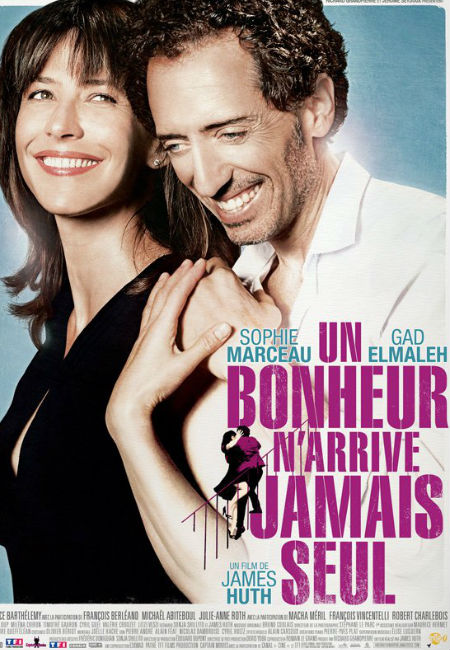
If the delightful charms of co-writer and director James Huth’s bubbly romantic comedy, Happiness Never Comes Alone, prove anything, it’s the truism of Shakespeare’s oft-quoted maxim from A Midsummer Night’s Dream, that the course to true love, [whatever that may be], never does run smooth.
Of course being a romantic comedy in the grand Hollywood tradition of Spencer and Tracy, Hudson and Day, the road to everlasting happiness for Sacha (Gad Elmaleh), a carefree jazz-playing woman-seducing man-child, and separated with three kids married to her job (and rich almost ex-husband) Charlotte (Sophie Marceau), is strewn with pratfalls, misunderstandings and near misses, with enough intensely intimate moments to make all the obstacle-surmounting worthwhile.
And the near palpable chemistry between the two leads, and the sheer pleasure they seem to take in each other’s company, invests their rocky journey to the supposed euphoric bliss of happy ever after with all the “awww” moments, charm, and hilarity you could want from a movie of this genre.
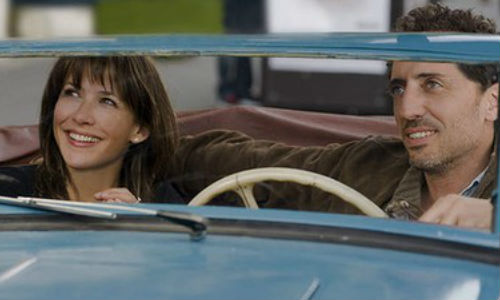
One thing is for sure.
Huth, and co-writer Sonja Shillito know their way around all the various tropes of the romantic comedy genre and aren’t afraid to use them all to good effect.
And that elevates Happiness Never Comes Alone from a simple paint-by-numbers recitation of the standard rom-com sequence of events to a movie that lives and breathes the challenges of merging two very different lives into one.
With a generous dose of almost Keystone Cops-esque physical comedy to keeps us laughing all the way to the end.
It all begins, naturally enough, with the “Meet Cute”, that time-honoured device where the Two Who Will Fall In Love come together in the most unexpected, sweet and totally unrealistic way.
The sort of meeting that would turn mere mortals off ever seeing that person again draws our two destined-to-be lovers together in a way so magnetic and irresistible that all they can do is give in to the inevitable.
Which is exactly what Charlotte, soaked to the skin by a sudden downpour and a passing car’s gigantic splash of water, and smarting from her head connecting somewhat comically with some errant car keys, and Sacha, the man who values having “no alarm clock, no wedding ring, no taxes” and yet who finds himself offering her a lift in his now “swimming pool” of a convertible car, sensibly do.
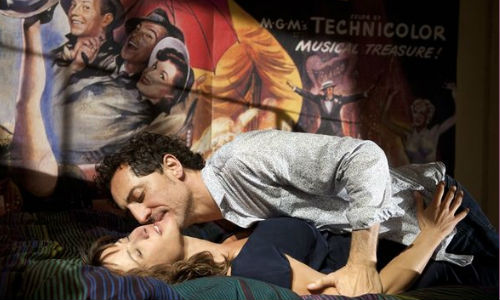
What follows is an afternoon and night of endless, alarm-clock knocking, bookshelf-clearing, CD tower demolishing lovemaking that collides rather brutally with reality at around 7.30 the next morning when Charlotte, realising the time, has to rush home to get her kids ready for school.
So rushed is her departure, complete with a slapstick fall down the stairs that Buster Keaton would have stood up and applauded, that Sacha isn’t even able to give her his phone number.
But this doesn’t stop the two smitten polar opposites, who find ways, and more importantly for Charlotte at least whose life is filled to the brim with commitments both personal and professional, time to spend with each other, in and out of bed.
Of course in the middle of the heady emotion-surging thrill of getting to know each other, Sacha who describes himself as kid-phobic in the film’s intro, finds out that the object of his unexpected affection, and the answer to his mother Madame Keller’s (Macha Méril) prayers, has three kids, an ex-husband, and an estranged husband, the ridiculously wealthy Alain Posche (François Berléand) who, it turns out employs them both.
Complicated much?
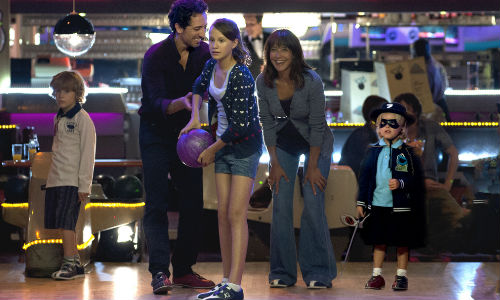
Ah yes it is but there is the potential for it to become even more so … and it does.
Sacha, who is struggling with incorporating a relationship, three kids with whom he bonds to his great surprise, and occasional alarm, into his previously hedonistic lifestyle, find himself backlisted at all the ad agencies for whom he writes jingles as part of his day job, in an act of vindictive pettiness by Charlotte’s spurned husband who unfortunately for Sacha is also his boss.
He is also juggling the rather demanding aspirations of his rather self-obsessed best friend Laurent (Maurice Barthélémy) to be a musical theatre great with his fears that he will never measure up to the enduring and wildly famous piano-playing talent of his father who died when he was 10.
Charlotte for her part, while disgusted by Alain’s unfaithfulness – “We had an Open Relationship. I was Relationship, he was Open” – find herself unable to sever the ties that bind them together, continuing to work at the art foundation she convinced him to establish to foster emerging French artists, and living not that far from him in an apartment which he owns.
Delighted though she is by Sacha’s unexpected entry into her life, and eager to move forward with her life, she finds herself unable to walk away from the wealth and power at her fingertips.
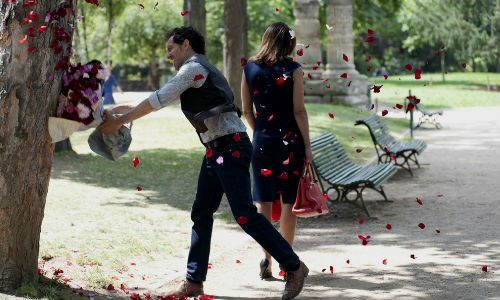
That is, of course, until the inevitable Grand Misunderstanding occurs as a result of Sacha’s emotionally immature reaction to his blacklisting, and they are forced apart, not once but twice, with the second of the separations sending Sacha to far off New York to make his musical mark thanks to Laurent, while Charlotte remains behind in Paris, gradually realising that she must uncouple from Alain if she is to forge any sort of meaningful life, with or without Sacha, of her own.
Naturally they ultimately end up in each other’s arms – it’s hardly giving away the ending of a romantic comedy to reveal that- but it takes so much effort, and emotional investment, and pain at times, that you feel like you are watching two real people grapple with the evolution of a relationship that both of them cannot live without.
The fact that Huth, Elmaleh and Marceau are able to give Happiness Never Comes Alone, a movie that bubbles along with all the crowd-pleasing confections of its genre, such a great deal of emotional resonance is a tribute to uniformly top notch performances and a script that pays as much attention to the depth and realness of its characters and its interactions as it does to the hilarious slaptsick that punctuates much of the film.
It is enthral to but not a slave to the conventions of romantic comedy.
Happiness Never Comes Alone is one of those rare modern rom-coms that doesn’t insult the intelligence, both intellectual and emotional, while harkening back to the screwball comedies that defined the genre.
You leave the cinema buoyed up as you should but also convinced that even if the course to true love is not as smooth as you’d like it to be, that it is definitely worth travelling down it if you get the opportunity.